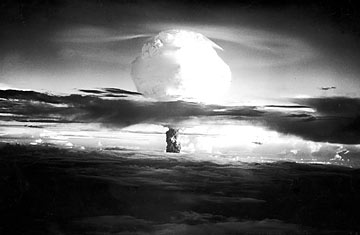
When President Barack Obama pledged to move toward the abolition of nuclear weapons in April 2009, replacing the Strategic Arms Reduction Treaty (START) was supposed to be the easy first step. But the 1991 agreement, which limits the number of long-range nuclear weapons in Russia and the U.S., expired on Dec. 5. And a replacement has yet to be agreed upon.
An intricate kind of mimicry must be choreographed in arms reduction, requiring all sides to resist the urge to twitch as guns are lowered simultaneously, with parity maintained throughout. Nothing is easy. Yet State Department spokesman Darby Holladay told TIME that negotiators are making "significant progress" toward a START replacement. There may still be hope for a swift resolution to outstanding problems.
The primary stumbling block to START negotiations has been a disagreement on how to even measure a reduction in nuclear weapons, arms-control experts say. Long-range nuclear missiles and bombers have the capacity to carry multiple, independently targeted weapons. So the question is, should a treaty limit the number of delivery vehicles available to each country, the number of actual warheads or both?
Recently, the U.S. reduced the number of warheads armed on top of missiles and on its bomber bases — but less so the number of bombers or missiles themselves. On the other hand, Russia — out of economic necessity — has reduced the number of missiles and bombers, while maintaining parity by keeping them more heavily armed.
As a result, the Russians would like to limit the number of delivery vehicles the two sides keep in their arsenals. The U.S. and Russia both have thousands of warheads in storage, which the START treaty (and likely its successor) will not touch. The Russians fear that if the U.S is allowed a vast force of half-empty missiles and bombers, it could in times of conflict quickly arm these delivery vehicles with stockpiled weapons — and thus have the capacity for an overwhelming "first strike" that could take out the more heavily concentrated Russian nuclear forces. That concern could breed distrust, and prove dangerous.
"This is a very important issue and one, I suspect, that has been the biggest cause of delays," says Hans Kristensen of the Federation of American Scientists. "We don't want Russian war planners deciding to put as many warheads as possible on their delivery vehicles — that is not a crisis-stable situation. It provides an incentive to launch first."
The new START treaty will probably skirt this issue by leaving both countries with robust nuclear forces — about 1,600 deployed strategic warheads, down from the 2,200 of the previous treaty, which is still more than enough to wipe each other off the map. But in the Strangelovean world of nuclear deterrence, the slightest threat to parity is a cause for major problems. Early on in the START negotiations last summer, Kristensen says, the Russians balked at a provision that would allow the U.S. to inspect the production facilities of its new RS-24 ICBM because they would not be able to inspect American ICBM construction sites. Kristensen says that's because the U.S. isn't building any new missiles. "It may seem absurd, but both sides are very edgy about maintaining parity in all respects," he says. "That makes negotiations very difficult."
Last week, Russian Prime Minister Vladimir Putin added another irritant to the disarmament talks by claiming that America's planned missile-defense system was holding up the new treaty. Russia has long claimed that the missile-defense system, components of which Obama agreed to remove from Europe last year, would force it to increase its nuclear capability. "There is a danger that our partners, by creating such an 'umbrella,' will feel completely secure and thus can allow themselves to do what they want, disrupting the balance, and aggressiveness will rise immediately," Putin said.
Steve Andreasen, a former director for arms control on the National Security Council, says that Putin's comments were likely a negotiating ploy and that Russia will probably raise its continuing concern about missile defense in later talks. "They are making clear that further reductions in offensive weapons cannot take place divorced from the issue of missile defense — a long-standing Russian position," he says.
Meanwhile, even if negotiators reach a START agreement, it will still require ratification in the U.S. Senate. And in a recent letter, 40 Republican Senators and independent Joe Lieberman suggested that they would not support the agreement unless Obama pledged to allocate money to "modernize" America's nuclear arsenal — that is to say, refurbish old warheads and potentially build new ones. That decision, in turn, hinges on the findings of Obama's "Nuclear Posture Review," in which the President will decide the nuclear forces he feels the U.S. needs to maintain in order to remain secure.
Given his stated commitment to work toward the abolition of nuclear weapons, it's possible the review will call for aggressive cuts. That can't happen, however, without Russia's cooperation, and the current START negotiations are only the beginning. Until that happens, however, both sides will remain locked in a nightmarish anachronism, with nuclear annihilation of both sides always only minutes away. As Andreasen says, "Most experts agree: We will need to do more than the new START, with greater urgency and on a much broader front, to get ahead of the nuclear danger."
